
Color, 1972, 100 mins. 2 secs.
Directed by Sidney Lumet
Starring James Mason, Robert Preston, Beau Bridges, Ron Weyand, Charles White
Cinématographe (Blu-ray) (US RA HD) / WS (1.85:1) (16:9), Olive Films (Blu-ray & DVD) (US RA/R1 NTSC) / WS (1.78:1) (16:9)
One of many 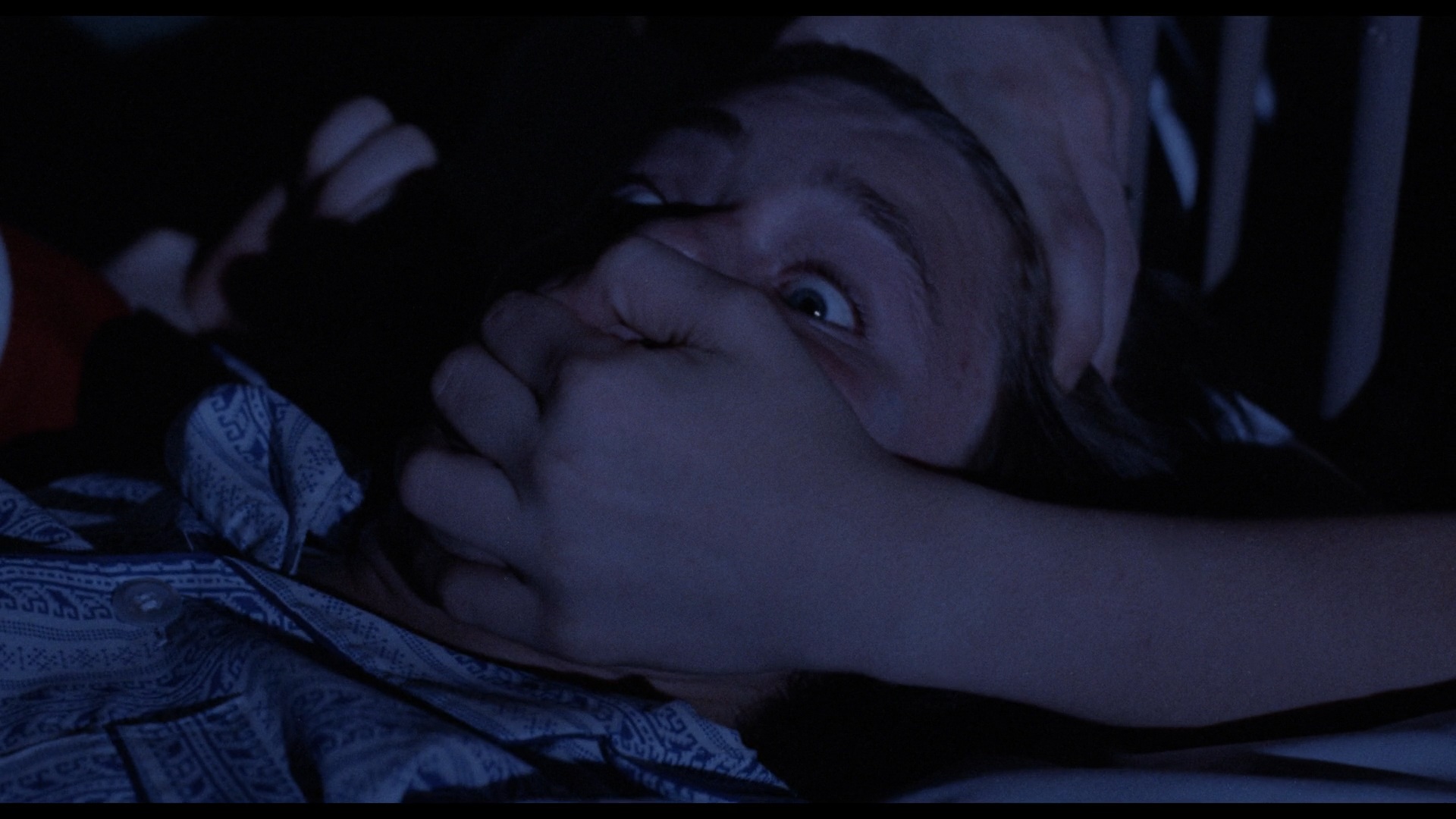 early '70s chillers cranked out by the studios in the wake of Rosemary's Baby, Child's Play charts the nasty tension erupting at a Catholic boys' school between two of its firmly entrenched teachers. English instructor Joe Dobbs
early '70s chillers cranked out by the studios in the wake of Rosemary's Baby, Child's Play charts the nasty tension erupting at a Catholic boys' school between two of its firmly entrenched teachers. English instructor Joe Dobbs 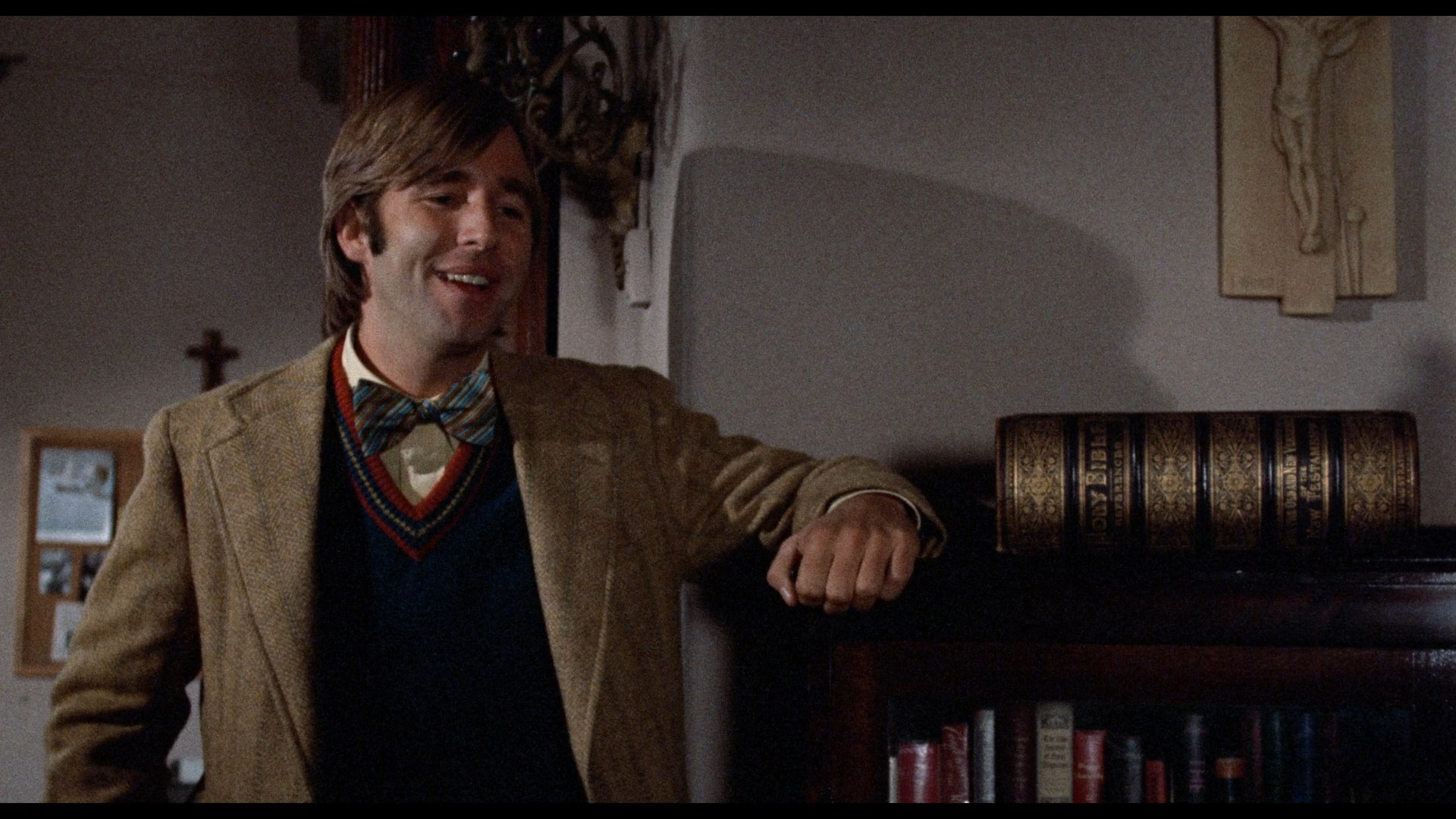 (Preston) is genial and beloved by most of the students past and present including Paul (Bridges), a student from ten years ago now returned to teach gym. Meanwhile the older Jerome Malley (Mason), who is crumbling under the strain of caring for his dying mother, strikes fear into the kids with his strict Latin lessons and is being subjected to prank phone calls and porn magazines mailed to his home. There's something wrong with the boys, too, who are first seen drawing blood from one of their number in bed and smearing a cross on his forehead. Another kid gets beaten up on the basketball court and has one of his eyes torn apart, while a third is bloodied and trussed up in the chapel where a Jesus statue once stood. Who, or what, is behind all this evil mayhem?
(Preston) is genial and beloved by most of the students past and present including Paul (Bridges), a student from ten years ago now returned to teach gym. Meanwhile the older Jerome Malley (Mason), who is crumbling under the strain of caring for his dying mother, strikes fear into the kids with his strict Latin lessons and is being subjected to prank phone calls and porn magazines mailed to his home. There's something wrong with the boys, too, who are first seen drawing blood from one of their number in bed and smearing a cross on his forehead. Another kid gets beaten up on the basketball court and has one of his eyes torn apart, while a third is bloodied and trussed up in the chapel where a Jesus statue once stood. Who, or what, is behind all this evil mayhem?
Perhaps the most shocking thing about Child's Play is the fact that it's the only horror film (sort of) directed by Sidney Lumet, a disciple of the Golden Age of Television who'd just come off the bizarre triple header of The Anderson Tapes, The Offence, and The Last of the Mobile Hot Shots. In fact, this film marks the close of his "arty" period before he went into his most famous crime mode with Serpico the next year, followed by Murder on the Orient Express and Dog Day Afternoon. So where does this one fit  in? That's tough to say, but it's fascinating to watch three very different lead actors bounce against each other. This was also part of a fascinating slate of films in the early '70s that found them dabbling around in different kinds of thrillers, including the somewhat similar Unman, Wittering and Zigo which would make an excellent co-feature with this one.
in? That's tough to say, but it's fascinating to watch three very different lead actors bounce against each other. This was also part of a fascinating slate of films in the early '70s that found them dabbling around in different kinds of thrillers, including the somewhat similar Unman, Wittering and Zigo which would make an excellent co-feature with this one.
Mason's often sinister brand of urbane charm is the biggest asset here, as a viewer's normal tendency to peg him as the villain gets thrown into doubt every few minutes. Meanwhile Preston, best known as the charming con man Harold Hill from The Music Man, is an interest last-minute replacement for Marlon Brando. 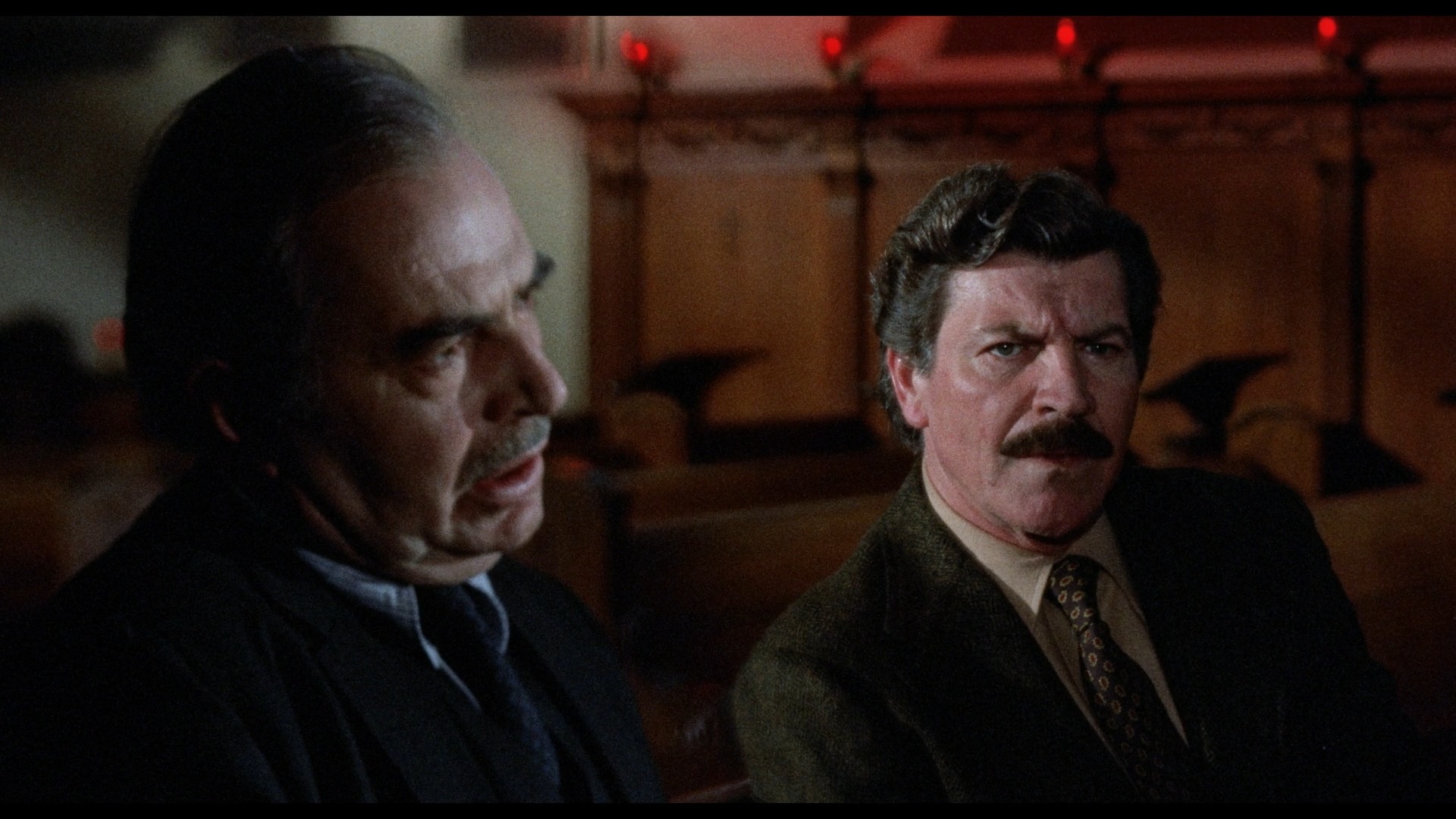 The ambiguity of his role would be a tough sell for any actor, and apart from a peculiar closing scene that's maybe a shade too nebulous for its own good, he walks a fine tightrope here between paternal compassion and possibly dangerous manipulation. That leaves Bridges, a rising star at the time who basically has to look befuddled for most of the running time. One of the real unsung stars here is actually composer Michael Small, delivering a genuinely scary score in a similar mode to his acclaimed work two years before on Klute. Thanks to his subdued but hair-raising compositions, even a simple shot of students standing in a doorway can make a viewer feel deeply
The ambiguity of his role would be a tough sell for any actor, and apart from a peculiar closing scene that's maybe a shade too nebulous for its own good, he walks a fine tightrope here between paternal compassion and possibly dangerous manipulation. That leaves Bridges, a rising star at the time who basically has to look befuddled for most of the running time. One of the real unsung stars here is actually composer Michael Small, delivering a genuinely scary score in a similar mode to his acclaimed work two years before on Klute. Thanks to his subdued but hair-raising compositions, even a simple shot of students standing in a doorway can make a viewer feel deeply  uneasy.
uneasy.
Not surprisingly, Child's Play (which has no connection to the Chucky films) was based on a stage play, in this case a Tony-winning work by Robert Marasco (author of the excellent novel Burnt Offerings) which originally featured Fritz Weaver, Pat Hingle, and Ken Howard. That would have made for a very different film, obviously, but what we have is an effective, oddly haunting little thriller released in the final hours before The Exorcist changed the game completely. Despite its pedigree, the film was never released on home video before the Olive Films release and repeatedly popped up on critics' and viewers' most wanted lists. Even TV airings were exceedingly rare, with dupey copies passed around among fans who'd been unsettled by this film during one of its infrequent appearances.
Thankfully Blu-ray and DVD editions did eventually come along in 2012 from Olive Films, finally presenting the essential balance of light and shadow intact here with deep, inky blacks and an accurate rendition of the original color schemes (including some brief but potent bursts of the color red at key moments). As with most Olive releases, it's presented as is with some occasional flecks and bits of dust on display.  The DTS-HD MA English 2.0 mono track also sounds fine; no extras are included. In 2025, Vinegar Syndrome's Cinématographe brought the film back into circulation as a remastered Blu-ray special edition with the usual deluxe packaging featuring deep dive new essays by Mitchell Beaupre, Patrick Dahl, and Madelyn Sutton covering Lumet's career to that point (and his own dismissive view of this film), the role of ambiguity in its narrative, and connections to other kids gone wild narratives. The transfer is a new 2K restoration from the original camera negative and improves on the earlier release, adjusting the framing to 1.85:1 versus the earlier
The DTS-HD MA English 2.0 mono track also sounds fine; no extras are included. In 2025, Vinegar Syndrome's Cinématographe brought the film back into circulation as a remastered Blu-ray special edition with the usual deluxe packaging featuring deep dive new essays by Mitchell Beaupre, Patrick Dahl, and Madelyn Sutton covering Lumet's career to that point (and his own dismissive view of this film), the role of ambiguity in its narrative, and connections to other kids gone wild narratives. The transfer is a new 2K restoration from the original camera negative and improves on the earlier release, adjusting the framing to 1.85:1 versus the earlier 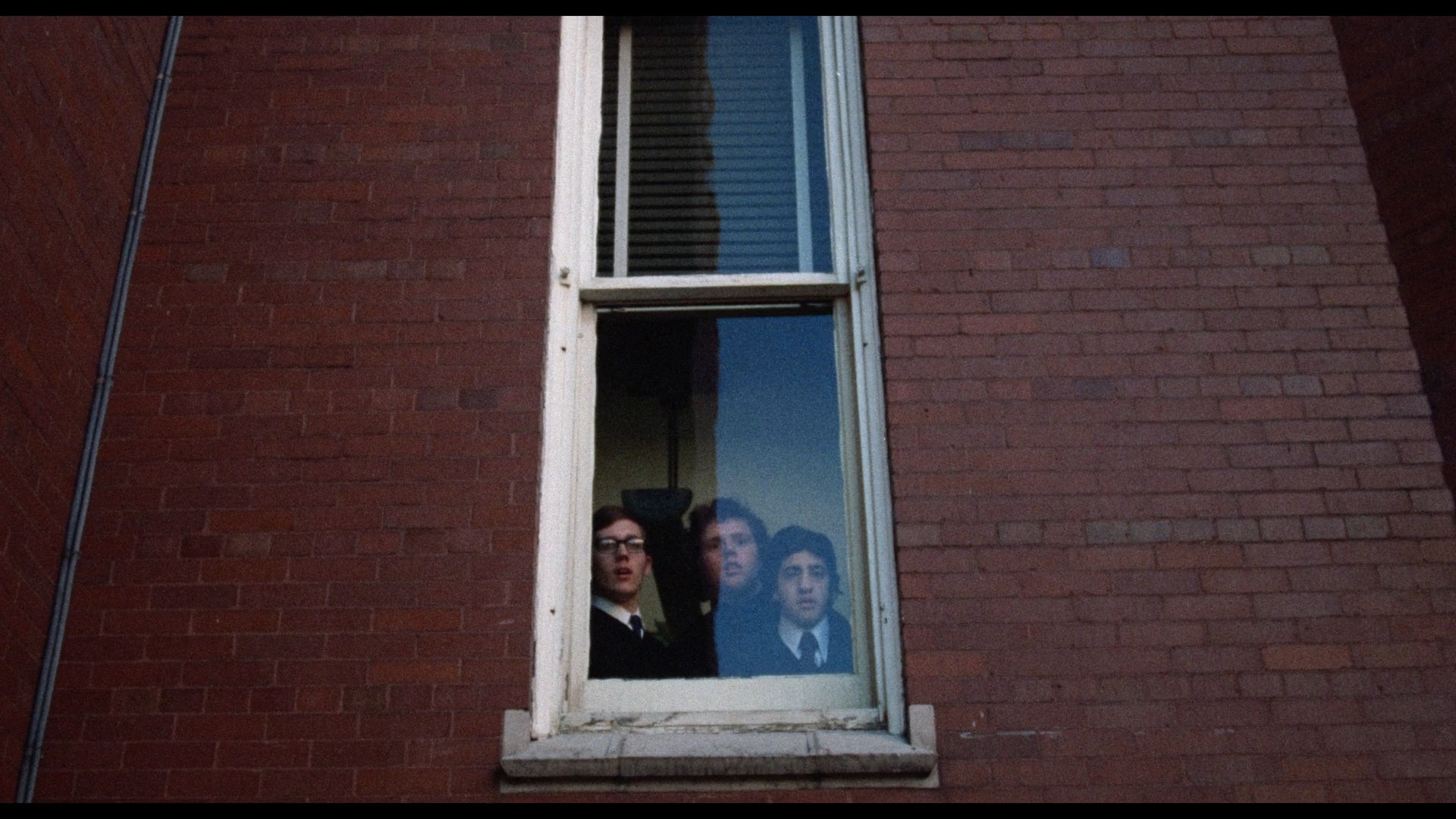 1.78:1 with significant additional image info on the sides. Color-wise it improves as well with less of a green cast throughout, and the DTS-HD MA English 2.0 mono track is in good shape (with the welcome addition here of English SDH subtitles). A new audio commentary by Adrian Martin finds him ruminating on the characters' actions and giving his take on what's happening on the screen. The video essay "Play to Strengths: Sidney Lumet, Stagecraft and Cinemacraft" (8m59s) by avowed Lumet detractor Daniel Kremer contextualizes this among his numerous stage adaptations (also included Equus, The Wiz, and Deathtrap among others) and noting how camera placement (including split diopter use) and the director's trademark hands-on approach with actors coalesced here. In "Designing Lumet" (14m46s), production designer Philip Rosenberg offers an audio discussion (via phone or video conferencing) about his memories of the director's swift, efficient process and strong leadership abilities starting with The Anderson Tapes. Another video essay, "One Stop on the Road to Serpico" (8m32s) by Daniel Griffith and C. Courtney Joyner, presents a history of the film's evolution including the aborted casting of Brando (and its attendant lawsuit), the critical reception, and the placement of it in between two very different police films with Serpico on the horizon. "One Step Further: Becoming Lumet" (57m1s) is a more expansive look at Lumet's early career starting with his watershed TV work and going through his milestones like The Pawnbroker, 12 Angry Men, The Fugitive Kind, Fail Safe, The Group, and The Hill. Finally you get an archival Lumet interview with Charlie Rose (42m29s) from 2006, promoting the release of his final theatrical feature, Find Me Guilty,
1.78:1 with significant additional image info on the sides. Color-wise it improves as well with less of a green cast throughout, and the DTS-HD MA English 2.0 mono track is in good shape (with the welcome addition here of English SDH subtitles). A new audio commentary by Adrian Martin finds him ruminating on the characters' actions and giving his take on what's happening on the screen. The video essay "Play to Strengths: Sidney Lumet, Stagecraft and Cinemacraft" (8m59s) by avowed Lumet detractor Daniel Kremer contextualizes this among his numerous stage adaptations (also included Equus, The Wiz, and Deathtrap among others) and noting how camera placement (including split diopter use) and the director's trademark hands-on approach with actors coalesced here. In "Designing Lumet" (14m46s), production designer Philip Rosenberg offers an audio discussion (via phone or video conferencing) about his memories of the director's swift, efficient process and strong leadership abilities starting with The Anderson Tapes. Another video essay, "One Stop on the Road to Serpico" (8m32s) by Daniel Griffith and C. Courtney Joyner, presents a history of the film's evolution including the aborted casting of Brando (and its attendant lawsuit), the critical reception, and the placement of it in between two very different police films with Serpico on the horizon. "One Step Further: Becoming Lumet" (57m1s) is a more expansive look at Lumet's early career starting with his watershed TV work and going through his milestones like The Pawnbroker, 12 Angry Men, The Fugitive Kind, Fail Safe, The Group, and The Hill. Finally you get an archival Lumet interview with Charlie Rose (42m29s) from 2006, promoting the release of his final theatrical feature, Find Me Guilty,
Cinématographe (Blu-ray)
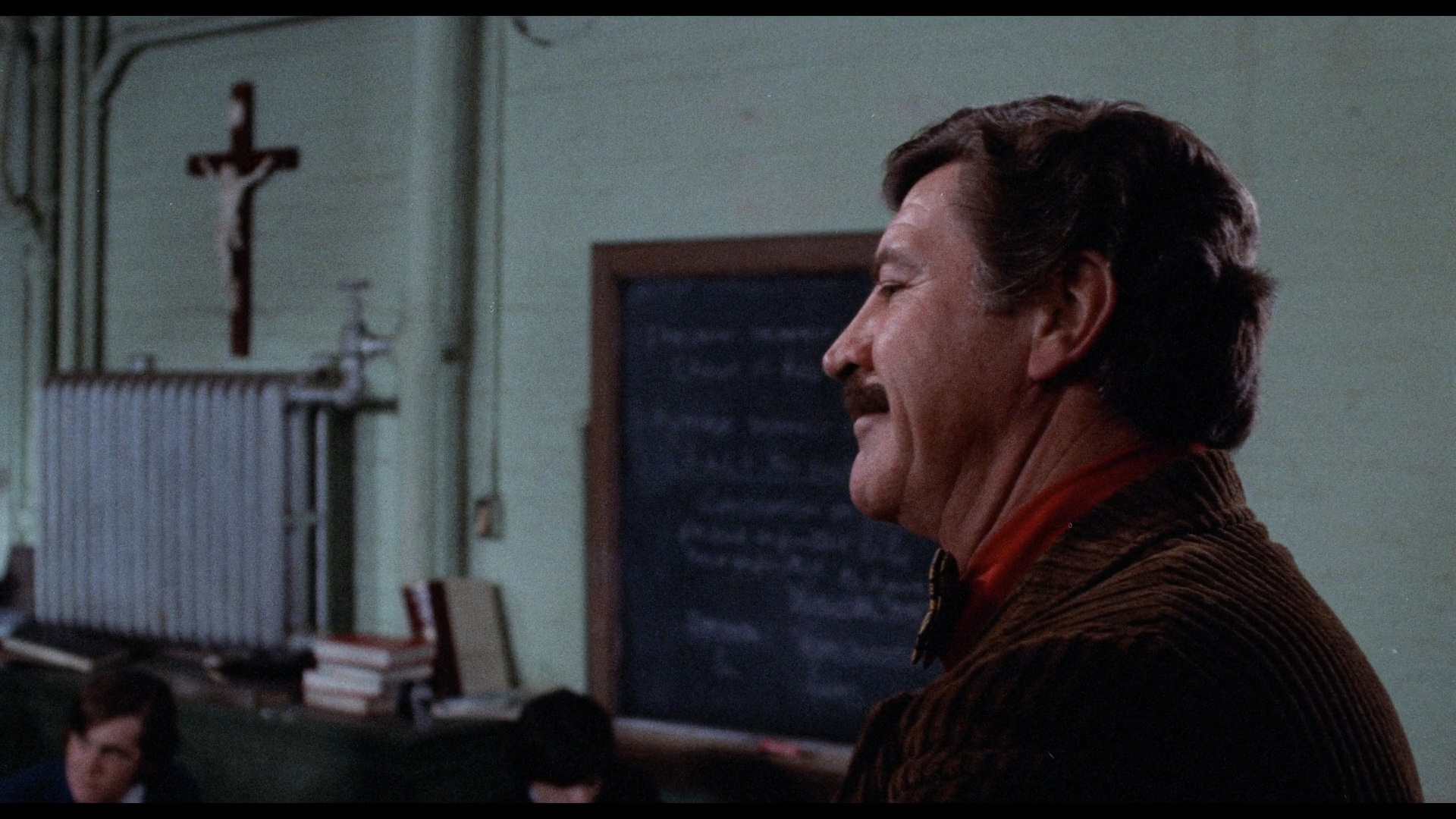
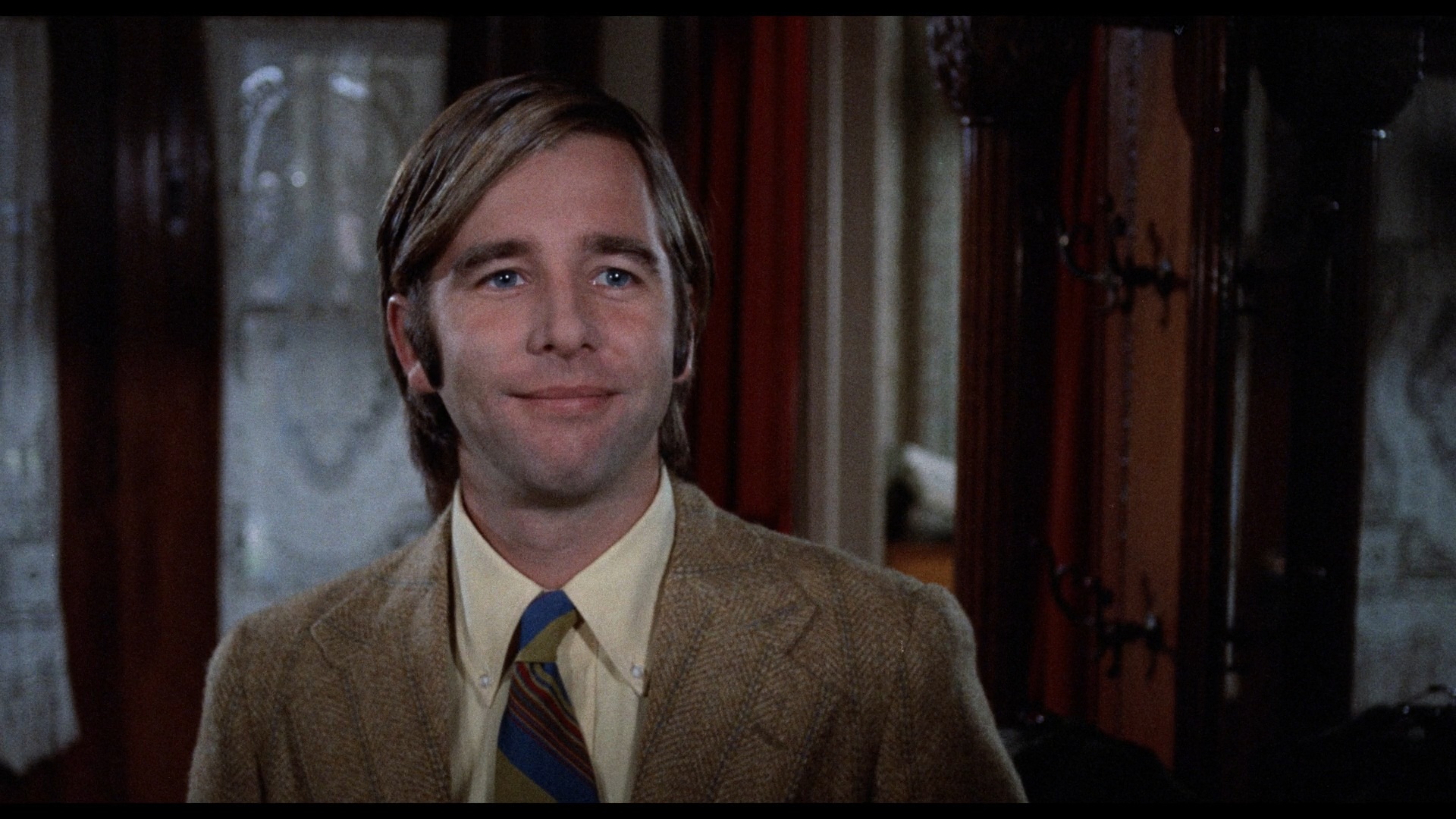

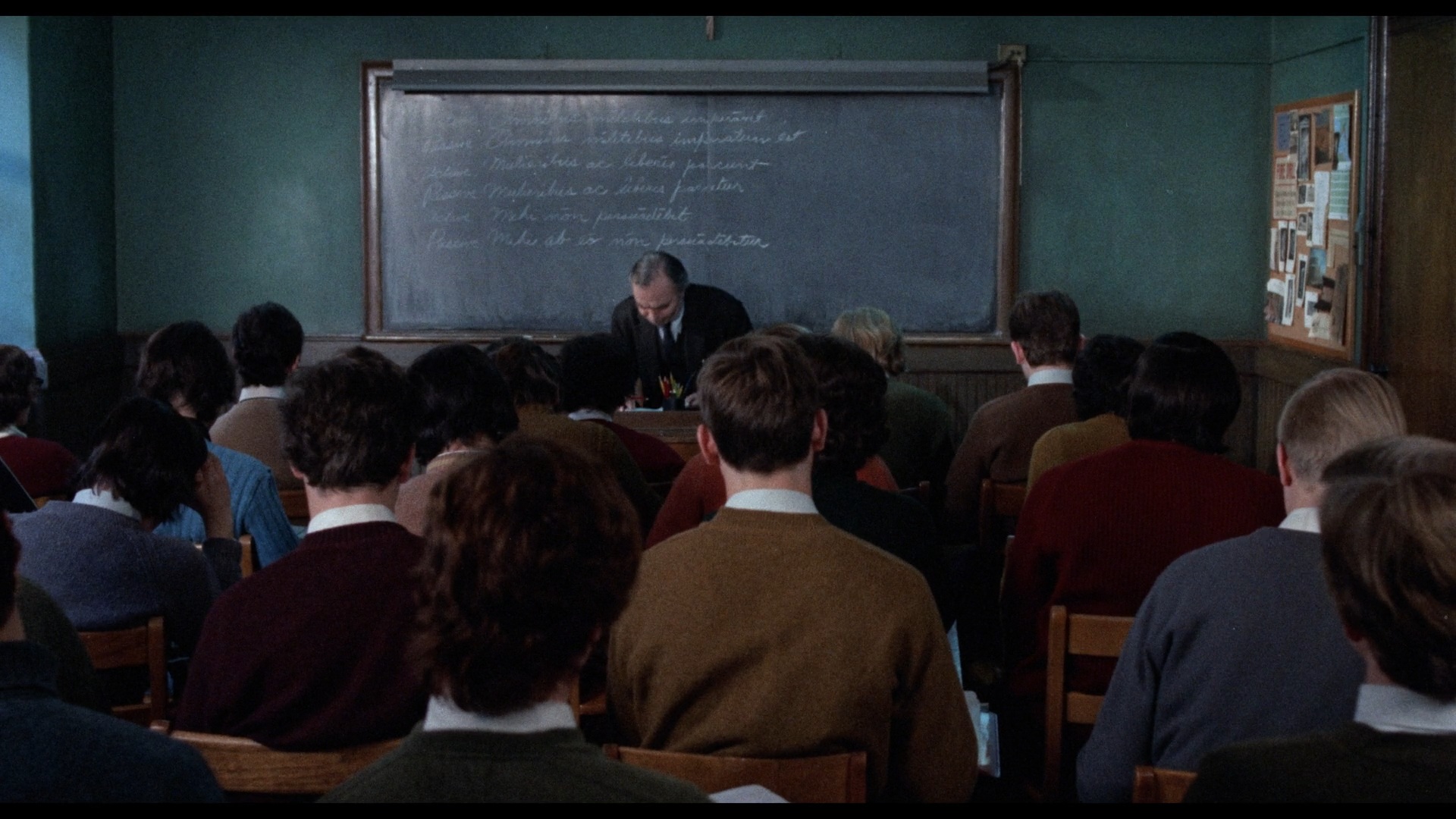
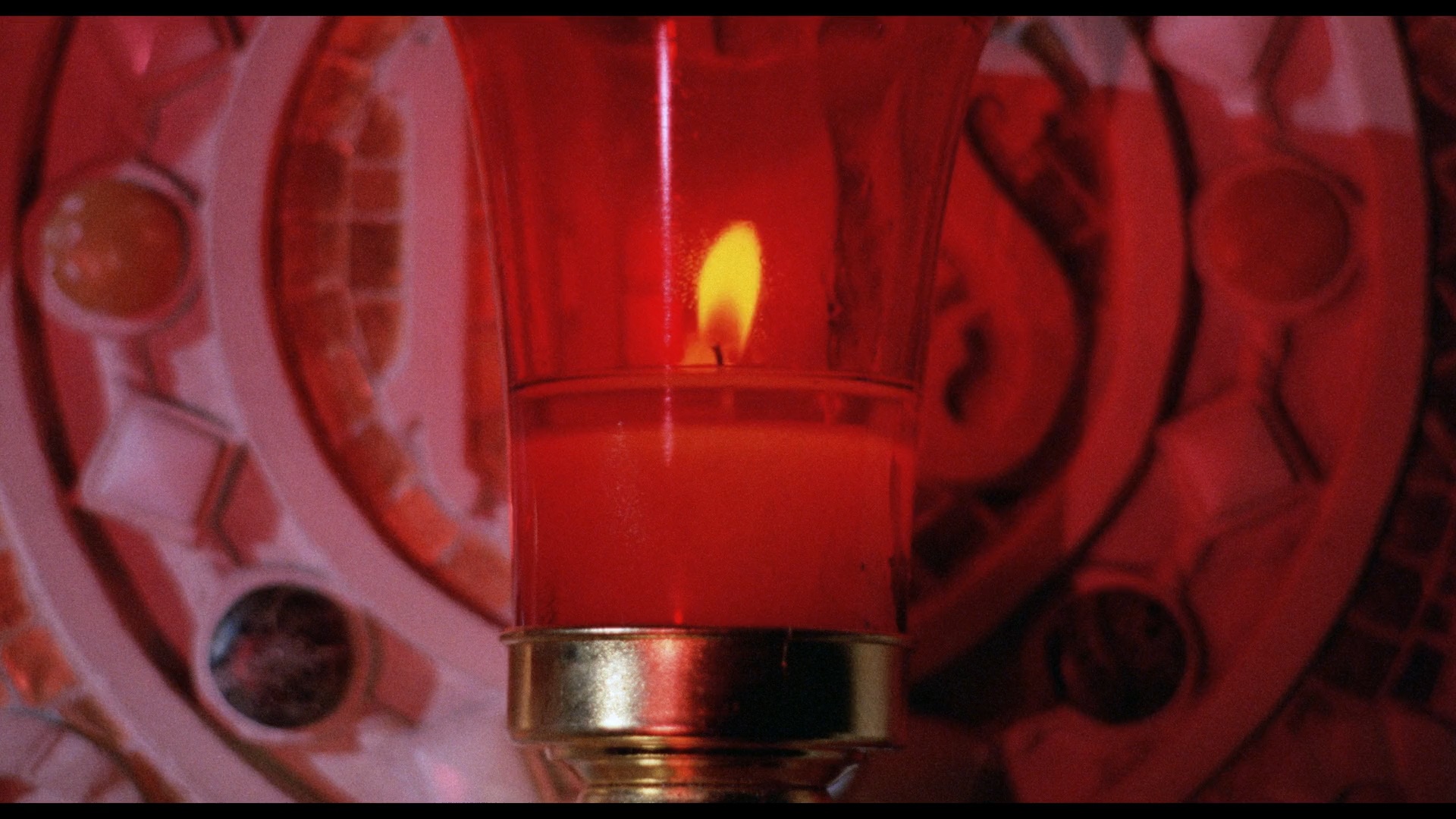
Olive Films (Blu-ray)
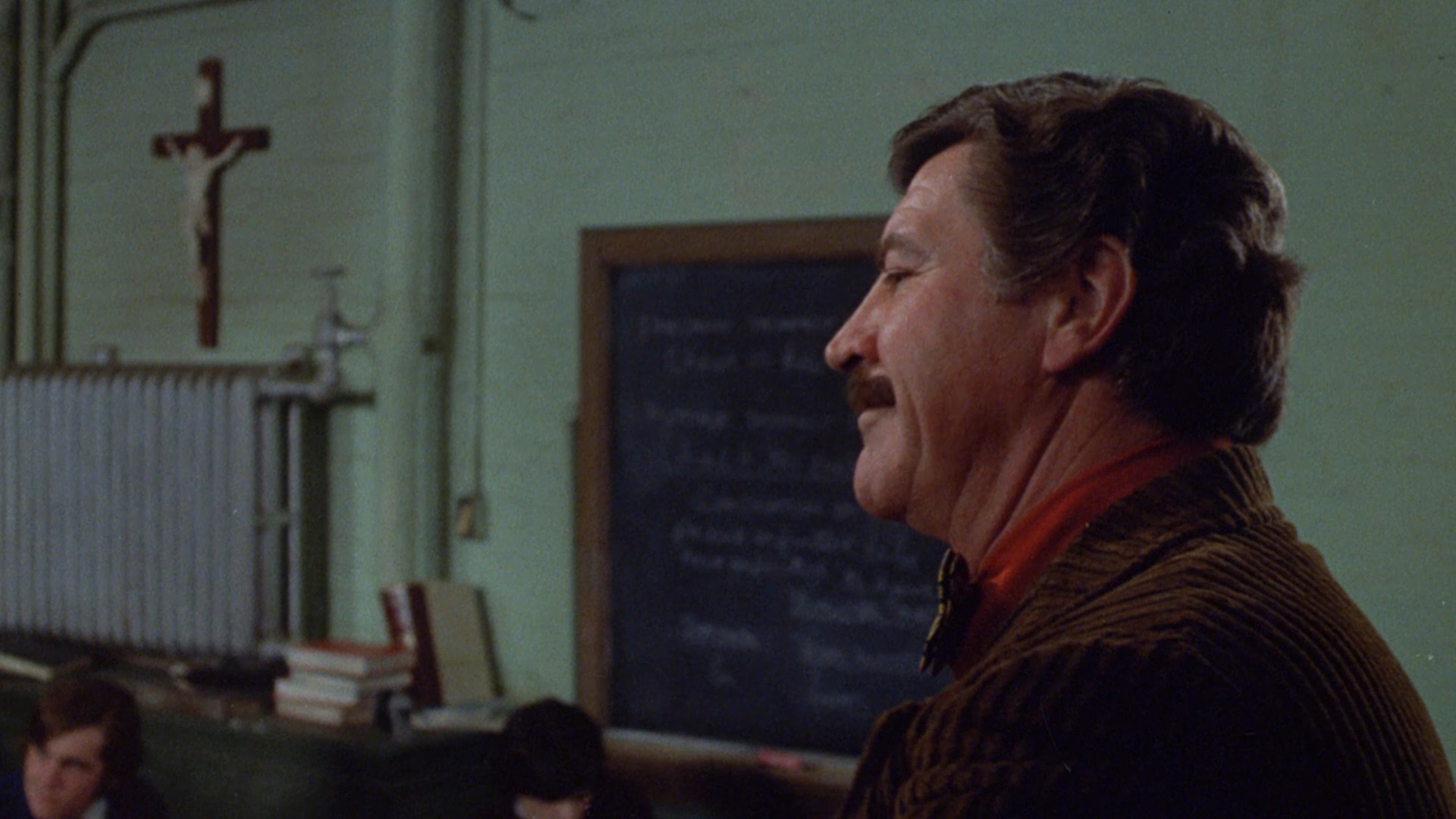
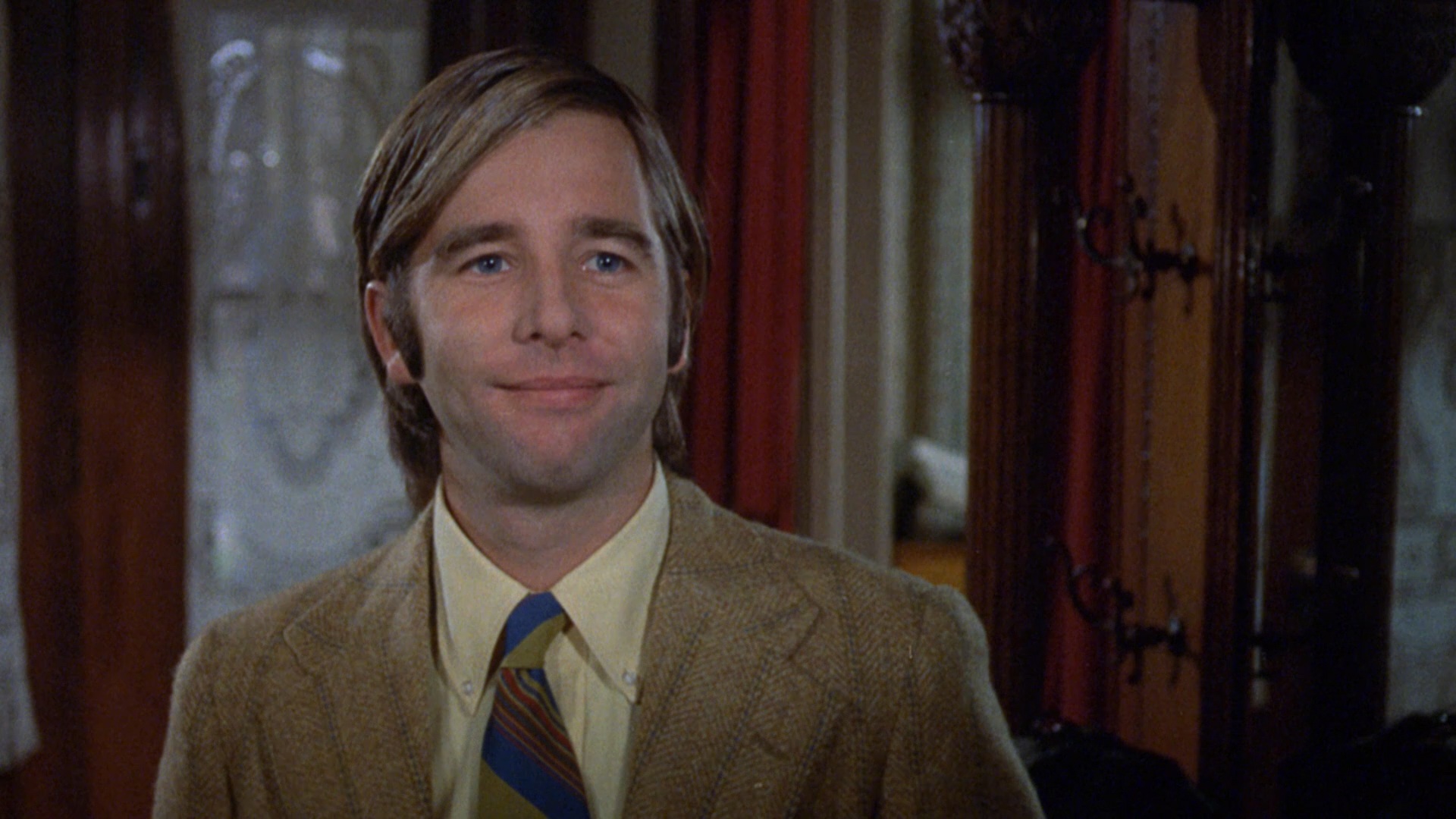


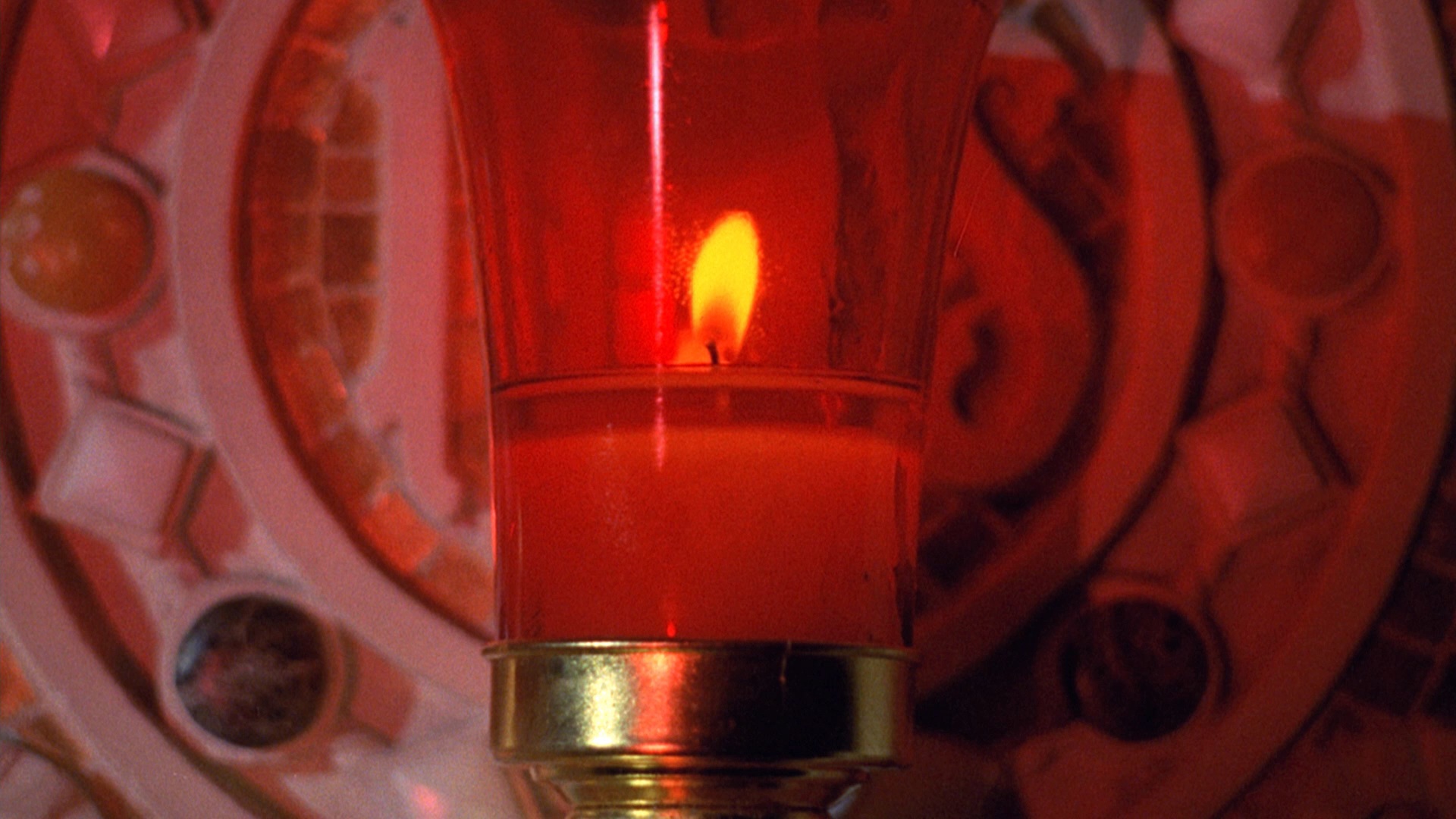
Updated review on January 26, 2025


 early '70s chillers cranked out by the studios in the wake of Rosemary's Baby, Child's Play charts the nasty tension erupting at a Catholic boys' school between two of its firmly entrenched teachers. English instructor Joe Dobbs
early '70s chillers cranked out by the studios in the wake of Rosemary's Baby, Child's Play charts the nasty tension erupting at a Catholic boys' school between two of its firmly entrenched teachers. English instructor Joe Dobbs  (Preston) is genial and beloved by most of the students past and present including Paul (Bridges), a student from ten years ago now returned to teach gym. Meanwhile the older Jerome Malley (Mason), who is crumbling under the strain of caring for his dying mother, strikes fear into the kids with his strict Latin lessons and is being subjected to prank phone calls and porn magazines mailed to his home. There's something wrong with the boys, too, who are first seen drawing blood from one of their number in bed and smearing a cross on his forehead. Another kid gets beaten up on the basketball court and has one of his eyes torn apart, while a third is bloodied and trussed up in the chapel where a Jesus statue once stood. Who, or what, is behind all this evil mayhem?
(Preston) is genial and beloved by most of the students past and present including Paul (Bridges), a student from ten years ago now returned to teach gym. Meanwhile the older Jerome Malley (Mason), who is crumbling under the strain of caring for his dying mother, strikes fear into the kids with his strict Latin lessons and is being subjected to prank phone calls and porn magazines mailed to his home. There's something wrong with the boys, too, who are first seen drawing blood from one of their number in bed and smearing a cross on his forehead. Another kid gets beaten up on the basketball court and has one of his eyes torn apart, while a third is bloodied and trussed up in the chapel where a Jesus statue once stood. Who, or what, is behind all this evil mayhem? in? That's tough to say, but it's fascinating to watch three very different lead actors bounce against each other. This was also part of a fascinating slate of films in the early '70s that found them dabbling around in different kinds of thrillers, including the somewhat similar Unman, Wittering and Zigo which would make an excellent co-feature with this one.
in? That's tough to say, but it's fascinating to watch three very different lead actors bounce against each other. This was also part of a fascinating slate of films in the early '70s that found them dabbling around in different kinds of thrillers, including the somewhat similar Unman, Wittering and Zigo which would make an excellent co-feature with this one.  The ambiguity of his role would be a tough sell for any actor, and apart from a peculiar closing scene that's maybe a shade too nebulous for its own good, he walks a fine tightrope here between paternal compassion and possibly dangerous manipulation. That leaves Bridges, a rising star at the time who basically has to look befuddled for most of the running time. One of the real unsung stars here is actually composer Michael Small, delivering a genuinely scary score in a similar mode to his acclaimed work two years before on Klute. Thanks to his subdued but hair-raising compositions, even a simple shot of students standing in a doorway can make a viewer feel deeply
The ambiguity of his role would be a tough sell for any actor, and apart from a peculiar closing scene that's maybe a shade too nebulous for its own good, he walks a fine tightrope here between paternal compassion and possibly dangerous manipulation. That leaves Bridges, a rising star at the time who basically has to look befuddled for most of the running time. One of the real unsung stars here is actually composer Michael Small, delivering a genuinely scary score in a similar mode to his acclaimed work two years before on Klute. Thanks to his subdued but hair-raising compositions, even a simple shot of students standing in a doorway can make a viewer feel deeply  uneasy.
uneasy. The DTS-HD MA English 2.0 mono track also sounds fine; no extras are included. In 2025, Vinegar Syndrome's Cinématographe brought the film back into circulation as a remastered Blu-ray special edition with the usual deluxe packaging featuring deep dive new essays by Mitchell Beaupre, Patrick Dahl, and Madelyn Sutton covering Lumet's career to that point (and his own dismissive view of this film), the role of ambiguity in its narrative, and connections to other kids gone wild narratives. The transfer is a new 2K restoration from the original camera negative and improves on the earlier release, adjusting the framing to 1.85:1 versus the earlier
The DTS-HD MA English 2.0 mono track also sounds fine; no extras are included. In 2025, Vinegar Syndrome's Cinématographe brought the film back into circulation as a remastered Blu-ray special edition with the usual deluxe packaging featuring deep dive new essays by Mitchell Beaupre, Patrick Dahl, and Madelyn Sutton covering Lumet's career to that point (and his own dismissive view of this film), the role of ambiguity in its narrative, and connections to other kids gone wild narratives. The transfer is a new 2K restoration from the original camera negative and improves on the earlier release, adjusting the framing to 1.85:1 versus the earlier  1.78:1 with significant additional image info on the sides. Color-wise it improves as well with less of a green cast throughout, and the DTS-HD MA English 2.0 mono track is in good shape (with the welcome addition here of English SDH subtitles). A new audio commentary by Adrian Martin finds him ruminating on the characters' actions and giving his take on what's happening on the screen. The video essay "Play to Strengths: Sidney Lumet, Stagecraft and Cinemacraft" (8m59s) by avowed Lumet detractor Daniel Kremer contextualizes this among his numerous stage adaptations (also included Equus, The Wiz, and Deathtrap among others) and noting how camera placement (including split diopter use) and the director's trademark hands-on approach with actors coalesced here. In "Designing Lumet" (14m46s),
1.78:1 with significant additional image info on the sides. Color-wise it improves as well with less of a green cast throughout, and the DTS-HD MA English 2.0 mono track is in good shape (with the welcome addition here of English SDH subtitles). A new audio commentary by Adrian Martin finds him ruminating on the characters' actions and giving his take on what's happening on the screen. The video essay "Play to Strengths: Sidney Lumet, Stagecraft and Cinemacraft" (8m59s) by avowed Lumet detractor Daniel Kremer contextualizes this among his numerous stage adaptations (also included Equus, The Wiz, and Deathtrap among others) and noting how camera placement (including split diopter use) and the director's trademark hands-on approach with actors coalesced here. In "Designing Lumet" (14m46s), 








